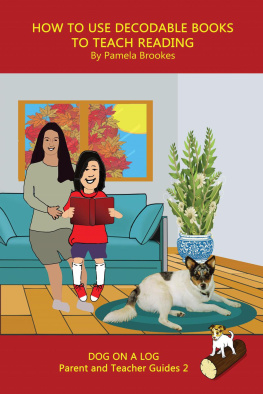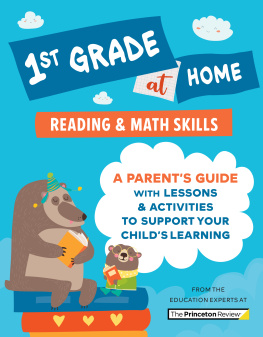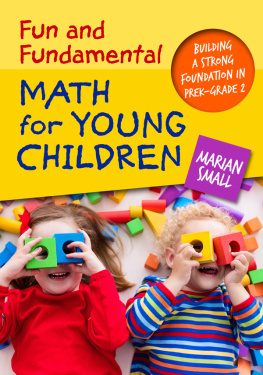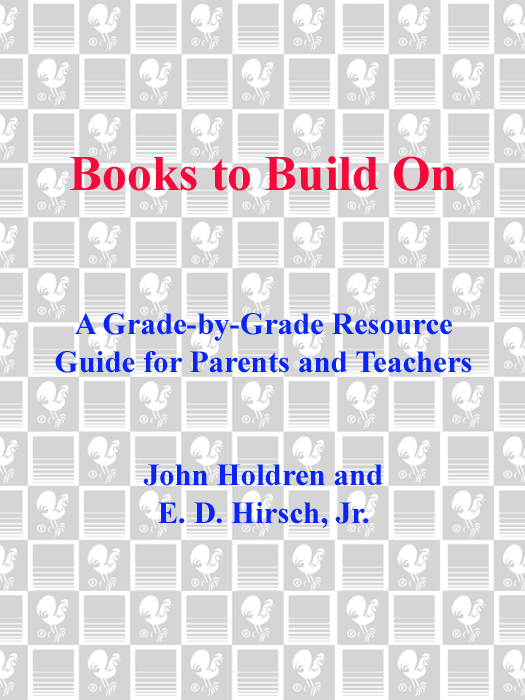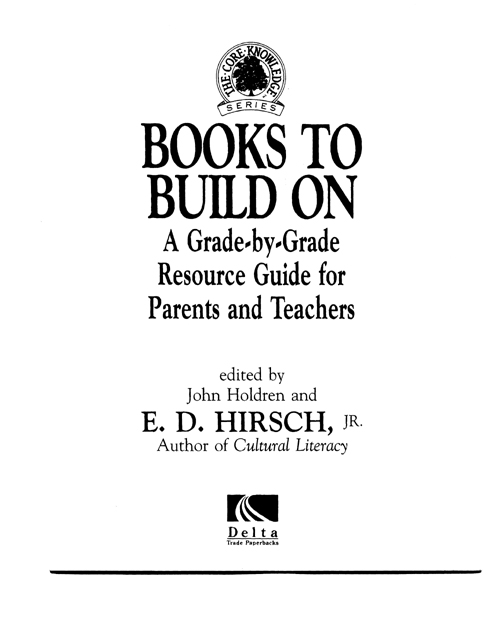A Delta Book
Published by
Dell Publishing
a division of
Bantam Doubleday Dell Publishing Group, Inc.
1540 Broadway
New York, New York 10036
Copyright 1996 by Core Knowledge Foundation
Core Knowledge is a trademark of the Core Knowledge Foundation.
All rights reserved. No part of this book may be reproduced or transmitted in any form or by any means, electronic or mechanical, including photocopying, recording, or by any information storage and retrieval system, without the written permission of the Publisher, except where permitted by law.
The trademark Delta is registered in the U.S. Patent and Trademark Office and in other countries.
Library of Congress Cataloging in Publication Data
Hirsch, E. D. (Eric Donald), 1928
Books to build on : a grade-by-grade resource guide for parents and teachers / edited by E.D. Hirsch and John Holdren.
p. cm.
eISBN: 978-0-307-56721-5
1. ChildrenUnited StatesBooks and reading. I. Holdren, John. II. Core Knowledge Foundation. III. Title.
Z1037.H646 1996
011.62dc20
9617200
v3.1
Editor-in-Chief, Core Knowledge Series: E. D. Hirsch, Jr.
Editor: John Holdren
Project Manager: Tricia Emlet
Writers: Tricia Emlet, Susan Tyler Hitchcock, John Holdren, Mary Beth Klee
Researchers, Consultants, and Assistants:
Julie D. Bauer, Carolyn Bradley, Cheryl Cannard, Tricia Emlet, Maria Goldstein, Pamela Griffith, Susan Tyler Hitchcock, John Holdren, Deborah Hyland, Blair Logwood Jones, Mary Beth Klee, Michael Marshall, Kathleen Lingle Pond, Chris N. Regan, Jeanne Nicholson Siler, Janet Smith, Nancy Strother, Martha Clay Sullivan, Linda Williams, Lois Williams
CONTENTS
Core Knowledge: Building Knowledge Year by Year or
Why Should I Teach Ancient Egypt to a First Grader?
INTRODUCTION
Can you recommend some good books on ?
This book is intended to lead you to many other booksbooks about history, geography, literature, language, science, math, and the fine arts. It was written to meet a need expressed to us by many parents and teachers. Since 1991, when we wrote What Your First Grader Needs to Knowthe first book in what are now seven volumes in the Core Knowledge Series (What Your KindergartnerSixth Grader Needs to Know)many parents and teachers have called or written the Core Knowledge Foundation. They have told us that their children and students are excited by the topics in the Core Knowledge books, and are eager to know more. And they have asked, What other good books would you recommend for our children on astronomy? Ancient Greece and Rome? Magnetism and electricity? Frederick Douglass? Susan B. Anthony? Impressionist painters? American tall tales? Africa? Japan?
To answer the requests for help, we have developed this annotated bibliography that briefly describes many good books for children. We hope Books to Build On will help parents select some of the best books for their children. We also hope this guide will help the growing number of teachers who are using the books in the Core Knowledge Series. These teachers have often said to us, Its been a while since I studied Ancient Egypt or plant photosynthesis. Can you recommend some books that will help me brush up on these and other topics? For teachers (and interested parents), this guide includes some books to help you continue to be a lifelong learner as you work with young learners.
Since there are thousands and thousands of childrens books to choose from, we have tried to be selective in this guide. Our purpose in recommending specific titles, however, is not to exclude others but to help you get started. Our researcherswho include the staff of the Core Knowledge Foundation and teachers and librarians in many Core Knowledge schoolshave tried to take a broad look at the wide range of available books, and from those to recommend ones that are informative, appealing, well written, and, in many cases, well illustrated. But no doubt we have missed some good titles, perhaps one of your favorites. If so, please let us know.
Also, in the sometimes fickle world of childrens publishing, many books, even good ones, go out of print with little notice. In advance we express our regrets for any frustration you may experience in seeking out a recommended title that has gone out of print since Books to Build On went to press.
A Focus on Nonfiction
The great nineteenth-century American poet Emily Dickinson wrote
There is no frigate like a book
To take us lands away.
Sometimes those lands are real: China, Africa, Australia, Mars, the bottom of the ocean. Sometimes those lands are imaginary: Narnia, Middle Earth, the Hundred Acre Wood.
The books in Books to Build On will take you to both real and imaginary lands, but to one more than the other. In the extensive Language Arts section of Books to Build On, we do recommend many of works of poetry and fiction: Aesops fables, fairy tales, Native American legends, Greek myths, tall tales, historical novels, and more. But the main focus of this guide is on nonfiction: history, geography, biography, science, math, and the fine arts.
This focus on nonfiction is in no way intended to suggest that exploring the solar system is more valuable than visiting Narnia or the Hundred Acre Wood. Children need a literary diet rich in both imaginative literature and nonfiction. There are a number of good guides that recommend even more fiction and poetry for children than we do here, and we encourage you to consult them. (Some of these guides are described on under Guides to Good Reading.)
In this guide we focus on nonfiction in order to support parents and teachers who want to help their children build strong foundations of important, interesting knowledge about a great many things, such as:
why the pyramids were built
what happens when you turn on a light switch
what instruments make up an orchestra
why Americans fought each other in the Civil War
whats beneath the surface of the Earth
who built the Great Wall
how the Plains Indians lived and the stories they told
what some brave American women did to get the right to vote
why most people in Latin America speak Spanish
why Americans celebrate the Fourth of July
what Mozart was like as a child
what the samurai did in ancient Japan
what happens when a volcano erupts.
This guide directs you to good books on those topics and dozens more. Taken collectively, these topics can form the core of a strong, well-rounded early education.
Building Knowledge Year by Year
Through reading (or listening to) some of the books recommended in this guide, your child can start building strong foundations of knowledge when she is young, and then continue to build on those foundations year by year. We have organized the recommended books in a year-by-year or, more precisely, grade-by-grade scheme, from kindergarten to sixth grade.
Why do we recommend books about the Great Wall of China for second graders, or about pyramids and mummies for first graders? Shouldnt you just help your child find good books on whatever interests him whenever it interests him? Thats always a good idea, especially for parents helping their children at home. Parents who are using this guide to enrich or supplement their childrens learning may want to think of the grade-level designations as flexible recommendations, depending on their childrens interests.


